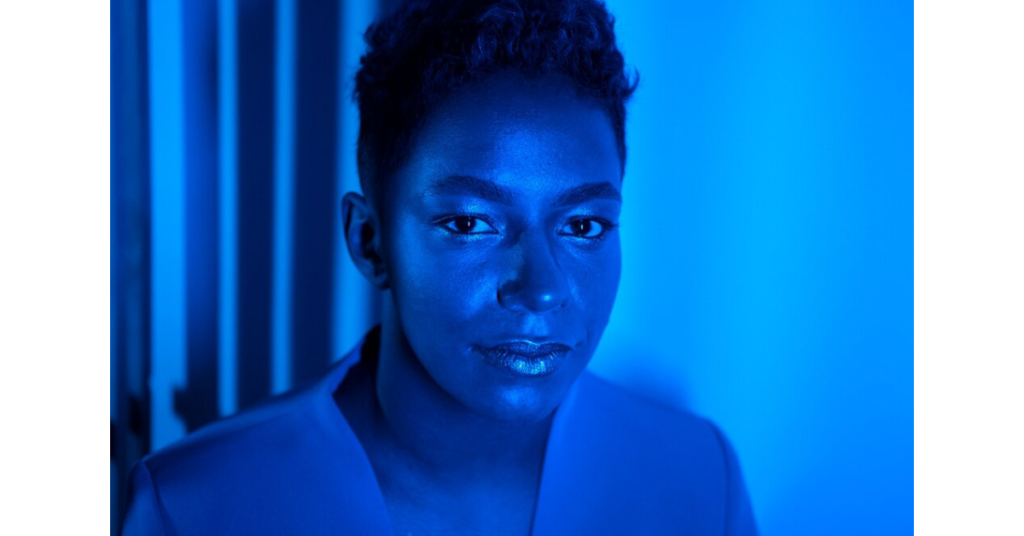Key Takeaways:
- Blue light from screens can have adverse effects on your skin.
- There are several ways to protect your skin from blue light exposure.
- Using blue light defense products can help mitigate these effects.
- Incorporating a holistic approach will offer the best protection.
Introduction: The Hidden Dangers of Blue Light
Blue light exposure is a constant in modern life, whether from your smartphone, computer, or tablet. However, few realize how much this light can affect our skin. Recent research indicates that blue light may contribute to premature aging, and pigmentation issues, and even interfere with your skin barrier function. Protecting yourself with products like blue light skincare solutions can mitigate these adverse effects. The importance of understanding these dangers cannot be overemphasized, as the impact of blue light goes beyond just the eyes and can even disrupt our circadian rhythms.
What Is Blue Light?
As a visible light spectrum member, blue light emits more energy due to its shorter wavelength. Blue light is released by digital screens, LEDs, and even fluorescent lights, in contrast to UV light released by the sun. This continuous exposure causes cumulative skin damage over time. Blue light is ubiquitous in our surroundings and contributes greatly to our daily exposure to light, so it is important to know what impacts it has. Effective preventive measures are necessary because the screening gadgets we use for work, education, and enjoyment contribute to this exposure.
Effects of Blue Light on Skin
Studies have shown that blue light may permeate and harm the skin differently. For example, one study discovered that blue light exposure may hasten aging and cause hyperpigmentation. Additionally, it has been demonstrated to produce reactive oxygen species, which damage the DNA of skin cells.
Hyperpigmentation and Aging
One of the most concerning effects of blue light on skin is hyperpigmentation. When the skin is exposed to blue light, it can trigger melanin production, resulting in dark spots. Moreover, blue light can accelerate aging by breaking down collagen, making your skin less firm and more prone to wrinkles. This is particularly problematic for those prone to pigmentation issues like melasma, which can be exacerbated by blue light. Collagen is essential for maintaining elasticity and firmness, so its degradation has far-reaching consequences on skin health and appearance.
Cellular Damage
Blue light has demonstrated that Reactive oxygen species are produced in the skin. These chemicals can seriously harm proteins, DNA, and lipid membranes, compromising the integrity of the skin barrier. This may eventually result in a compromised skin barrier and moisture loss. Blue light can penetrate deeper into the skin than UV radiation, which predominantly affects the outermost layers of the skin, resulting in deeper cellular stress. This may lead to inflammation, which can set off a chain reaction of other skin conditions, such as eczema and acne.
How to Protect Your Skin from Blue Light
You can take several practical steps to shield your skin from the adverse impacts of blue light:
- Use Blue Light Filters: Many devices have built-in blue light filters or you can download apps that perform this function.
- Apply Sunscreen: Some sunscreens now contain ingredients specifically designed to block blue light.
- Incorporate Protective Skincare: Products enriched with antioxidants can counter the free radicals generated by blue light exposure.
Application of Specific Sunscreens
Many new-age sunscreens come formulated to combat blue light. These formulations include ingredients like zinc oxide that offer physical protection against UV and blue light. This kind of sunscreen creates a barrier that reflects light away from the skin, preventing it from penetrating and causing damage. Many of these products also include other beneficial ingredients like antioxidants to provide a multi-faceted protection approach. Not all sunscreens offer blue light protection, so reading the labels and choosing products designed for this specific purpose is essential.
Protective Skincare Products
Incorporating blue light skincare products with potent antioxidants to complement sunscreens can significantly bolster your skin’s defense mechanism. Products containing ingredients like niacinamide, vitamin C, and retinoids are especially effective. For instance, Niacinamide helps strengthen the skin barrier and reduce inflammation, while vitamin C neutralizes free radicals and promotes collagen synthesis. Regularly using these products can improve skin resilience and repair damage caused by blue light exposure.
Skincare Ingredients That Help Combat Blue Light
Some specific ingredients are particularly effective in defending against blue light damage. These include:
- Niacinamide: Known for its anti-inflammatory properties, niacinamide helps improve the skin barrier and offers protection against blue light. It is a beneficial supplement to any skincare regimen since it also helps to lessen the visibility of wrinkles and fine lines.
- Vitamin C: This antioxidant lessens oxidative stress on the skin by scavenging free radicals. Additionally, vitamin C has brightening qualities that can help even out skin tone and lessen the visibility of blue light-induced dark patches.
- Zinc Oxide: Often found in mineral sunscreens, zinc oxide provides a physical barrier on the skin’s surface. This ingredient is non-irritating and suitable for sensitive skin, offering broad-spectrum protection against various forms of light, including blue light.
Behavioral Changes for Better Skin Protection
Besides using products, making a few lifestyle adjustments can further help mitigate blue light damage:
- Avoid using screens for extended periods, especially before bedtime. The blue light emitted from screens can disrupt your sleep cycle by interfering with melatonin production. Reducing screen time, particularly in the evening, can help you sleep better and allow your skin to repair itself overnight.
- Take regular breaks to reduce cumulative exposure. The 20-20-20 rule can reduce eye strain and exposure to blue light. Every 20 minutes, one has to pause for 20 seconds and look at something 20 feet away.
- Increase your intake of foods high in antioxidants to help your skin from the inside out. Foods high in antioxidants, such as berries, almonds, and leafy greens, can help your body fight oxidative stress. Fish and flaxseed contain omega-3 fatty acids, which also help maintain healthy skin and reduce inflammation.
Combining Efforts for Maximum Protection
The best strategy to shield your skin against blue light is to combine skincare products, physical barriers, and lifestyle modifications. In our technologically advanced world, blue light exposure is unavoidable. However, a comprehensive approach will guarantee that your skin stays healthy despite this. By implementing these tactics into your everyday routine, you may greatly lessen the negative effects of blue light on your skin. Your skin’s defensive mechanisms will be strengthened and kept resilient and youthful by using high-quality skincare products, making behavioral changes, and eating a diet strong in antioxidants.







